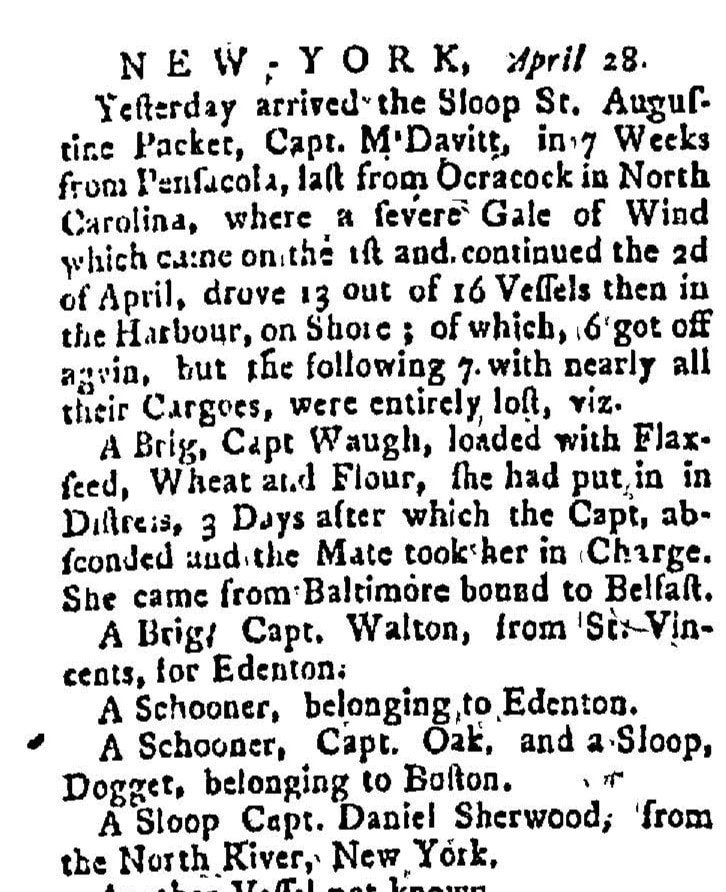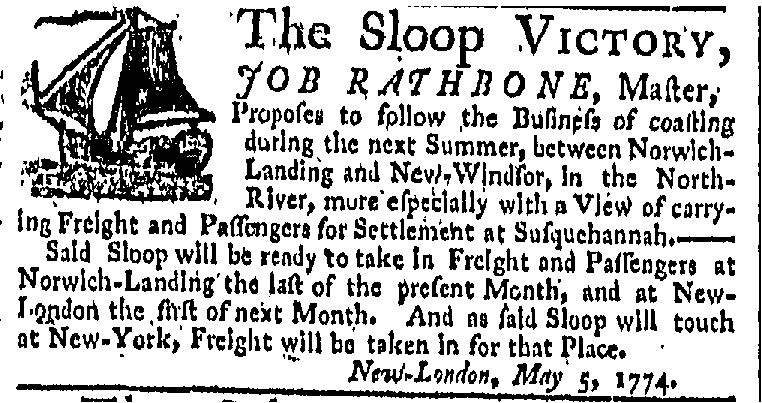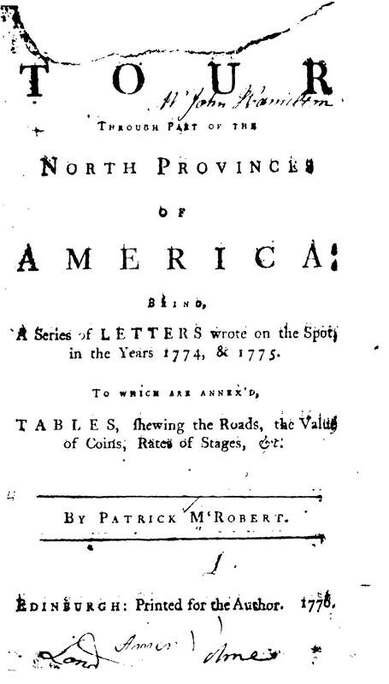|
April 28, 1774. New-York Journal; or, The General Advertiser (New York, N. Y.) Yesterday arrived the Sloop St. Augustine Packet, Capt. M'Cavitt, in 7 Weeks from Pensacola, last from Ocracock in North Carolina, where a severe Gale of Wind which came on the 1st and continued the 2d of April, drove 13 out of 16 Vessels then in the Harbour, on Shore; of which, 6 got off again, but the following 7 with nearly all their Cargoes, were entirely lost, viz. *** A Sloop, Capt. Daniel Sherwood, from the North River, New York. May 13, 1774. Connecticut Gazette; and the Universal Intelligencer. (New London, Connecticut) The Schooner Dolphin, Lying in Niantick-River, WILL Sale [sic] for ALBANY, About the 20th of May next. For Freight of Passage enquire of Constant Crocker or Hezekiah Russel. New-London, April 29, 1774. May 20, 1774. Connecticut Gazette; and the Universal Intelligencer. (New London, Conn.) The Sloop Victory, Job Rathbone, Master, Proposes to follow the Business of coasting the next Summer, between Norwich-Landing and New-Windsor, in the North-River, more especially with a View of carrying Freight and Passengers for Settlement at Susquehannah, --- Said Sloop will be ready to take in Freight and Passengers at Norwich-Landing the last of the present Month, and at New-London the first of next Month. And as said Sloop will touch at New-York, Freight will be taken in for that Place. New-London, May 5, 1774. Reprinted, A Tour Through Part of the North Provinces of America. . . . Edinburgh, 1776, edited by Carl Bridenbaugh, in 1945. (p. 14) LETTER II. New York, Aug. 18, 1774. From New York, we imbarked on board a sloop bound for Albany which is between 160, and 170 miles distant. The course is mostly north, the river being pretty straight. This river is from one to three miles broad below the high lands, which are forty miles from New York. The banks on the west-side are steep and rocky for near twenty miles; after that, you see a good country on both sides for several miles, till you come to the entrance to the high lands. Here the river is contracted to about a quarter of a mile in breadth, and guarded, as it were by rocky precipices, one would think, hanging over their head some hundred fathoms high. Here the ragged rocks covered with trees hanging over the river below, the vessels under sail, as if it were starting from some cavern in the shaggy rocks, the rivulets powring down from such an immense height, form, perhaps, one of the grandest landscaps in nature. These ragged mountains continue for about twelve miles; the we came to a tolerable level country, and the river extends to its usual breadth. Several pleasant country seats are to be seen on both sides; here, on the west bank of the river is a little town called Windsor, having a good quay, and large granaries, and stores for holding the grain of the adjacent country, where it is brought to be sent to New York (p. 15) for exportation. They have also many landing places, at convenient distances up the river, where granaries are built for the same purposes; here the country people for thirty or forty miles bring their wheat on sleighs or sledges on the snow in the winter. A pair of horses will draw thirty bushels of wheat in one of these sledges thirty miles upon the snow, and return the same day. We passed many fine country seats, and orchards, within view of the river; we had also a view of the Blue or Catskill mountains, but at a great distance: and after a fine passage of twenty seven hours we arrived at Albany. This is a considerable large town, or city as they would have it called, built on the west-side of Hudson's river, on the declivity of a hill. The houses are mostly brick; but of an old fashioned make, with their gables to the streets. There is here an English church, a high and low Dutch church, with a Presbyterian meeting-house. The streets are very dirty: they have a fort that overlooks the town, but in bad repair. Their hospital has been a spacious wooden building, in a fine airy situation; but is now almost uninhabitable. The barracks are in the same condition. To this place belong about fifty sloops from fifty to eighty tons each, employed constantly on the river in carrying down wheat, pease, boards, and other lumber to New York. They likewise have three vessels in the West India trade, and one that trades to London. The inhabitants are mostly of Dutch extraction whose language and manners they in a good measure retain, tho' they can mostly speak English. They are a heavy and dull people, at least they appear so to me. They are said to be very (p. 16) honest, tho' not the most hospitable; nor will they easily be persuaded to accommodate you with what you want, when in their taverns. *** In the river are caught several sorts of fish, particularly sturgeon, and in the spring vast shoals of a kind of herrings, which are taken many miles above this town. The Weather is sensibly colder here than in New York, where it is very hot at this season of the year, for six weeks or two months. The river is also frozen over for perhaps three months in winter, which is scarcely ever the case at New York. Indian corn and grass seem to thrive rather better here than at New York. The soil or climate seems also more favourable for oats. We made some little excursions into the country to the westward of Albany, where the soil after a few miles, mends; and you come into very good land, and thriving settlements. They have a great many saw-mills erected for working their pine into boards, which they (P. 17) send down the river to New York. After a few days we embarked again for New York: our vessel running aground about 12 miles below Albany, we went ashore: Here we found plenty of apples and cherries in the woods, fine water and timber, plenty of mellons, cucumbers, squashes, &c. and some little plantations of tobacco. *** At about ten miles further down the river, we went ashore and saw them make pot and pearl ashes. About forty miles further down we went ashore, where they have many lime-stone quarries: We saw fifteen or sixteen kilns all burning at once. I observe all above the high lands but getting in their crops (Aug. 10), but those below have them all in a week ago. They have a great advantage over you in point of climate. Their grain is far more thoroughly dried than you can get it. This makes it both keep better and grind cleaner. They often throw 10,000 bushels of it into the hold of a vessel to lie for a two or three months voyage, without receiving any damage. Tradesmen and labourers wages are high in all the province: a joiner six shillings a-day, a mason or brick-layer the same, and other trades in proportion, but they must be good hands, else they won't get employ till they go to the back settlements. Labourers have their three and four shillings a-day about New York; but at present they seem rather overstocked, owing to the arrival of so (p. 18) many adventurers from Britain and Ireland; they tell me that no less than twenty two vessels have arrived at New York with passengers within these twelve months. There is plenty of room and employ for them in the back counties, where many of them have gone. Patrick M'Roberts, Tour through Part of the North Provinces of America : Being a Series of Letters Wrote on the Spot, in the Years 1774, & 1775. Edinburgh, 1776 1774-08-18. Tour through Part of the North Provinces of America. Patrick M’Robert. October 3, 1774. New-York Gazette; and the Weekly Mercury (New York, New York) SOME time in June last, there was shipped on board Harmanus Cuyler's sloop, for Albany, 3 hogshead and one barrel, for which no owner has as yet appeared. Any person claiming the same, proving their property and paying charges, may have them again by applying to the said Harmanus Cuyler, in Albany. November 28, 1774. New-York Gazette; and the Weekly Mercury (New York, New York) Yesterday Evening we received the melancholy News that Mr. Case's Boat, in going home to Haverstraw last Friday Night, overset, by which Accident 10 of the Passengers were drowned, among them 4 or 5 Women; 6 'tis said are saved. December 5, 1774. New-York Gazette; and the Weekly Mercury (New York, New York) WHEREAS Capt. William Coe, of New-Hempstead, in Orange County Precinct, and town of Harverstraw was drowned on Friday, the 25th of November, 1774, in the North-River, near Dobb's Ferry, and is not yet found: This is to give notice, that if any person or persons should find him, and deliver him to any of his friends, with all the things found upon him, shall receive FIVE POUNDS reward, and all reasonable charges paid by Judge Coe, or Peter Vandervoort, living at Kakiate. He was about 5 feet 8 or 9 inches high, had black hair, and was well set; had on a redish bearskin surtout, homespun light coloured coat, black velvet jacket with horn buttons, brown velvet breeches, blue and white stockings, a wollen check shirt, with a linen check collar, and red and white silk handkerchief round his neck, a pair of small plated buckles in his shoes, and a pair of steel knee buckles; also a silver watch in his pocket. JOHN COE, PETER VANDERVOORT
0 Comments
Your comment will be posted after it is approved.
Leave a Reply. |
AuthorThis collection was researched and catalogued by Hudson River Maritime Museum contributing scholars George A. Thompson and Carl Mayer. Archives
June 2024
Categories
All
|
|
GET IN TOUCH
Hudson River Maritime Museum
50 Rondout Landing Kingston, NY 12401 845-338-0071 [email protected] Contact Us |
GET INVOLVED |
stay connected |
Proudly powered by Weebly







 RSS Feed
RSS Feed